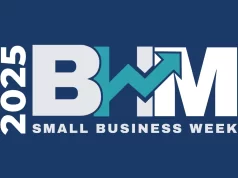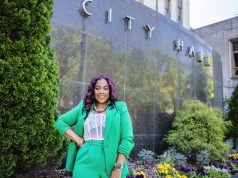By Clara Green
“It’s hard to hate up close.”
Those were the words spoken by a welcoming uncle to his curious young nephew. The nephew wanted to know why the uncle always invited so many people, from all walks of life, to Thanksgiving dinner.
“One year, I asked him, ‘How am I related to everybody here?’” the nephew recalled. “They were a racially diverse group, an ethnically diverse group, a socially diverse group, and a geographically diverse group. I remember him saying to me, ‘Logan, you’re related to them not by the blood in your veins but by what’s in your heart – and what’s in their heart.’”
The uncle’s view was this: We’re all connected by three similarities. One is the love of family. Another is we all want to be respected and appreciated. And the third is that, at some point in our lives, we’re going to face hard times, and we’ll need others to be there with us.
“So, Logan, this is your family,” the uncle explained.
And that’s why, each year, he made it a point to open his home to people he’d met along life’s journey. They may not be blood relatives. But if only we take the time to look, we can always find common bonds.
“We’re Spanish on my side of the family, so we’re huggers and kissers,” Logan added. “So my uncle leans in really close; he takes my head in his hands and gives me a kiss on each cheek, and he gets about two inches from my face, and that’s when he said it: ‘It’s hard to hate up close.’ And his point was to just get to know people. You’ll see just how many great people there are.”
That was decades ago. And Logan Pichel, whose own life’s journey led to him becoming an executive at Regions Bank, still follows – and shares – his uncle’s advice.
Over the last year, our teams at Regions have been on a journey, too. It’s a journey toward better understanding, more openly welcoming, and always respecting the unique backgrounds of colleagues across our organization.
Along the way, we’ve had a series of candid conversations that reflects the value Regions places on diversity. Each conversation, open to Regions associates and streamed to company offices in several states, has offered insights that can help all of us better appreciate the experiences of others.
One of our earliest discussions was with Regions CEO John Turner, who shared how fostering diversity makes Regions a better bank. But it’s not just about diversity, he shared. Inclusion must be at the heart of our journey, too. Diversity is having more people at the table. Inclusion is listening to everyone’s voices – and actively seeking the perspectives of people whose backgrounds are different than our own.
Another conversation featured women leaders from different departments at the bank, as well as from different generations. They shared a message of inspiration and empowerment, with a focus on charting a course, overcoming challenges, and building professional and personal success.
During Black History Month, we heard from the first African-American mayor of our headquarters city, Birmingham, Alabama, joined by the current mayor, who is also African-American. They talked about history and being an African-American leader then and now. They spoke of progress in terms of equality and opportunity. And they acknowledged the progress society still needs to make.
In May, we recognized Asian Pacific American Heritage Month and invited colleagues from China, Pakistan, the Philippines and India to share how they’ve found a sense of belonging in the U.S., which can be a challenge for people in new surroundings. Another colleague, raised in the U.S. by Taiwanese parents, reflected his pride in being bicultural.
During June, we celebrated LGBTQ+ Pride Month. Two of our colleagues told personal and transparent stories about coming out. Another colleague shared the story of his son coming out – and talked about his responsibility as a parent. We walked away from that conversation with a clearer understanding of how there is so much more to members of the LGBTQ+ community than their sexuality.
“I didn’t change when I came out,” one of our panelists said. “I’m still the person I am, and just getting people to realize that is important for everybody.”
In September, we focused on Hispanic Heritage Month. Three colleagues told of their families’ immigration to the United States. Some of their parents and ancestors came legally; others came illegally, seeking exile from unsafe conditions. We were left to ponder the risks we would be willing to take personally in search of a better life.
During October, which is National Disability Employment Awareness Month, we heard from author David Cooks, who motivated us by showing how he’s fulfilling his purpose, despite being a T6 paraplegic since he was a teen. He spoke of how the Americans with Disabilities Act has helped level the playing field, but there’s a need to consistently ensure people living with disabilities have access to opportunities for professional growth. “I think the next step, now that I can get in the bathroom, is to figure out how to get in the boardroom,” he said.
Our conversation series is taking a very intentional approach toward ensuring that we’re listening to voices from across demographic groups, and that includes a recent conversation with white male colleagues, who I also see as an important piece of our diversity and inclusion puzzle. We heard these colleagues share how they champion diversity and inclusion, serving as advocates and allies for others. And we reaffirmed that, to be a truly inclusive organization, everyone needs to see themselves as part of the equation. “It’s my responsibility to be part of helping ensure we have a level playing field,” one participant shared, as all others agreed.
Why is Regions taking these steps? Indeed, we believe a diverse and inclusive organization is better suited for meeting the needs of our communities. But it’s not only that. We also believe it is fundamentally the right thing to do. People deserve a workplace that values them for who they are. We want our colleagues to know they are welcomed – and valued. And we believe a consistent focus on diversity and inclusion helps us better understand each other – and helps our organization grow stronger.
Our goal is not to see others through the narrow lens of labels or stereotypes. Rather, we see a greater value in taking the time to get to know each other – up close.
Clara Green is Executive Vice President, Head of Diversity and Inclusion at Regions Bank.
Updated at 12:45 p.m. on 12/5/2019 to correct wording in headline and add a sentence previously omitted.




